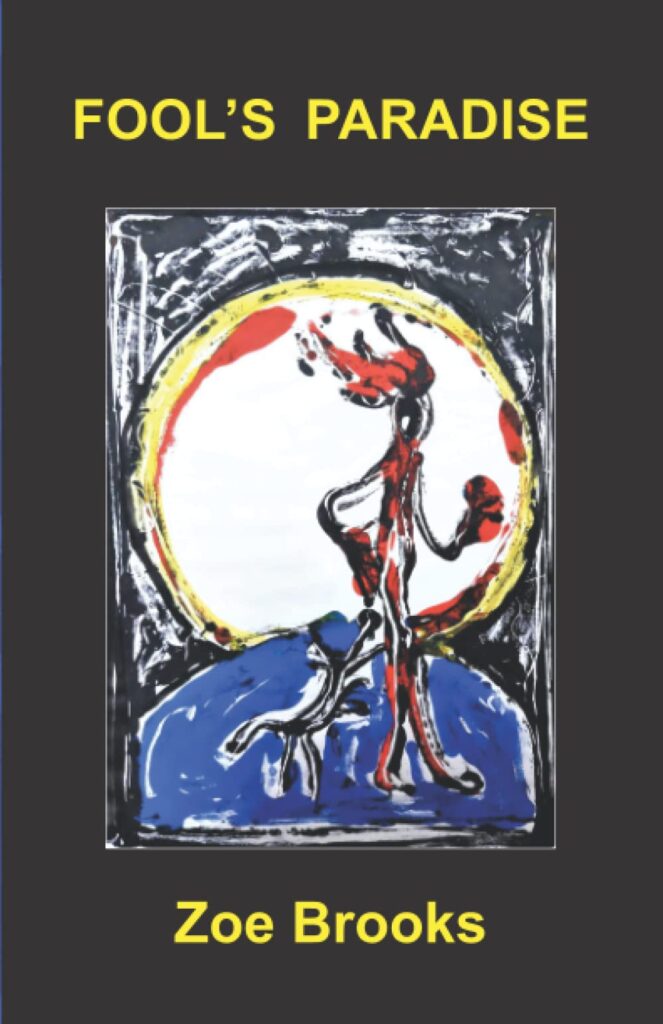
To craft poetry that remains impactful and affecting whilst avoiding emotive, didactic writing is a real art. And Fool’s Paradise by Zoe Brooks is a rare example of this type of artistry –a potent book which is nuanced, suggestive and often ambiguous. Brooks is writer who avoids easy answers, and questions play a huge part in this ‘play for voices’ in which we join three travellers as they meet The Fool and journey to a devastated city. Are the travellers alive or dead, are they arriving home or is this their first time in a new city? Who is the Fool? What is the ‘strange dance does he leads them on? Fools Paradise was written after a trip to Prague just after the Velvet Revolution but could be set anywhere where atrocities have occurred and where the disposed and exiled struggle for existence.
Indeed being lost is a prevalent theme within this noir parable as reader and traveller alike are disorientated by the riddles of the fool, who like the fool in many a Shakespearean tragedy, proves to be the wisest of them all – his seemingly obscure and surreal speeches holding profound truths about human existence.
On the edge of the destroyed city and, hell itself, the fool locates them by saying
Now we only walk on the brim of the world
Mayflower larvae must struggle in the mud
Before they break through the skin
And stand on the concave world awhile.
Come my little grubs, allusions over.
This is an electrifying and extraordinary read with the musicality of Dylan Thomas in another ‘play for voices’, Under Milk Wood, the terrifying hellishness of Dante’s Purgatory and the imagistic brilliance and dark wit of Sylvia Plath. The language is unremittingly powerful and affecting with the author oscillating between deliciously lush and theatrical verse and darkly comedic, conversational sometimes crassly colloquial dialogue.
Fool’s Paradise never flinches from the representation of violence and is brutal and clear-eyed in its depiction of the ‘domesticity of terror’. Yet the transcendent beauty of the language is never lost. Take these words by the Fool for example:
In Summer when the roses are blown
I behead them and bury their beauty
In precious oils
And with each knife cut
the sap runs like blood.
Fool’s Paradise is a complex, multi-layered book; it include symbols, cyphers, puzzles, Jungian Symbolism, religious iconography, bombs, ethnic cleansing, war, fascism and destruction whilst retaining a lush aesthetic beauty.
Even in the bleakest. most nihilistic of statements there is lyricism –
The air is full of dancing feet,
Of thump, beat,
Of angels,
Weeping angels
Angels in fire,
Angels carrying candles.
The world is destroyed at last.
Always we walk in darkness,
unless we take darkness by the hand.
The unnamed woman says in Fool’s Paradise – and this beautiful and timely book is a call to arms in many ways, an entreaty to the reader to face not just the darkness upon the word stage but to face their own shadows and by doing so come into the light.
As Traveller 3 says:
We are come into that dark place
Where All Hallows is no Longer celebrated
And where we must pick up our own shadows
With each pull of the string this talented poet makes the reader dance as if a puppet of the fool. And perhaps the darkly coruscating art play of the author is best expressed in these lines by the Fool:
For what is the world
but a string of pearls?
And I lay then on the ground
to play marbles.
Books like Fool’s Paradise don’t come around very often and once you read them, they remain with you. Like a visit to a foreign city, this book, with all its strange magic, and uncanny sights stays with you long after reading and echoes in your ears like ‘the sounds of dancing on the roof tiles’.
Anna Saunders has been described as ‘a poet who surely can do anything’ by The North, ‘a modern myth maker’ by Paul Stephenson. She is the author of Communion, (Wild Conversations Press), Struck, (Pindrop Press), Kissing the She Bear, (Wild Conversations Press), Burne Jones and the Fox, Ghosting for Beginners and Feverfew – described as ‘rich with obsession, sensuousness and potency’ by Ben Ray, and as ‘a beautiful and necessary collection’ by Penny Shuttle. Her new book is The Prohibition of Touch, due out Dec 12 with Indigo Dreams.
